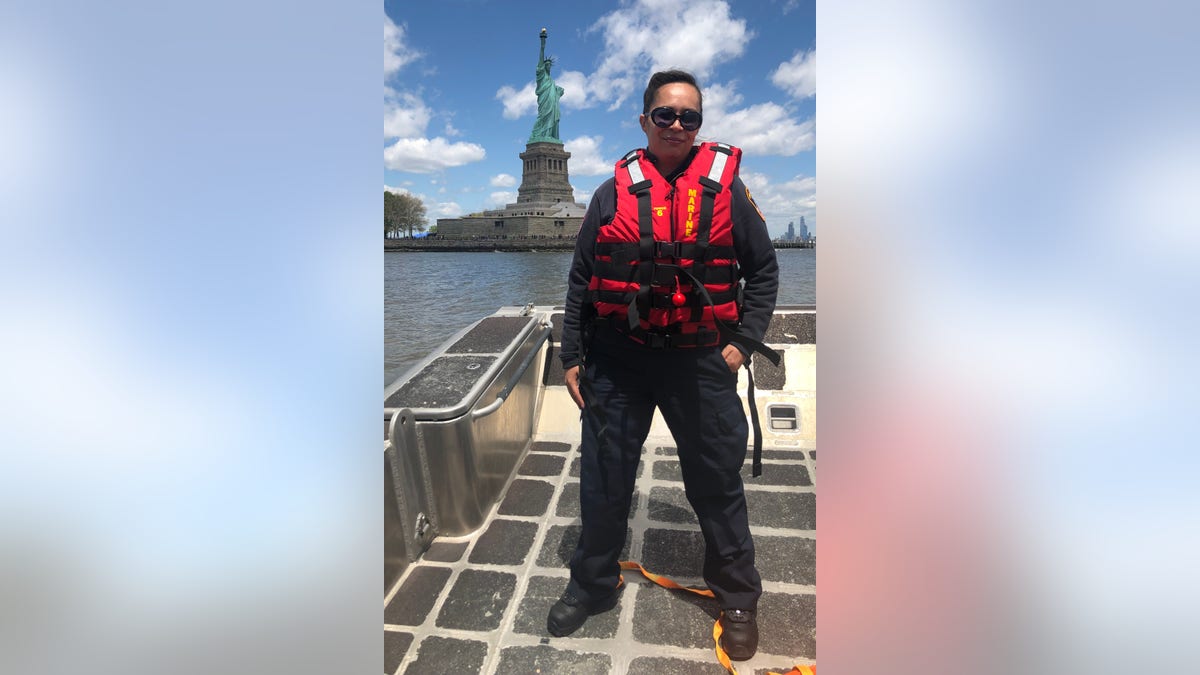FDNY paramedic shares experience on frontlines of coronavirus fight: It's like a battlefield out there
Megan Pfeiffer joins Shannon Bream on 'Fox News @ Night.'
Get all the latest news on coronavirus and more delivered daily to your inbox. Sign up here.
During the height of the coronavirus crisis in New York City, the 911 emergency system was flooded with more calls than on Sept. 11th, 2001, and paramedics and EMS workers tried valiantly to save lives.
The FDNY says the call volume has tapered off in recent weeks, but the emotional and physical toll the pandemic has taken on first responders in America’s epicenter remains.
“A lot of my colleagues are sort of perched on a precipice because we're wondering if it's the decline of the pandemic or if it's the eye of our storm,” Chez Valenta, a FDNY rescue paramedic at Brooklyn's Station 35 told Fox News. “Is there another side to the virus that we haven’t seen yet?”
CLICK HERE FOR FULL CORONAVIRUS COVERAGE
Valenta, a 37-year-old New Zealand native, has been a paramedic for 19 years and has worked for the FDNY for almost half of them. She says the past two months have been “emotionally damaging” and have forced her to live isolated in her home.
“I think anyone with exposure to the virus itself, and to patients, understands inherently that you may catch it because you’re so saturated by it," she said. "I minimize my contact with people. I go to the grocery store once a week and otherwise I go to work. But other than that, I don’t leave my home.”

FDNY paramedic Chez Valenta says that the past two months of the pandemic have been “emotionally damaging.”
Paramedics don gowns, gloves, goggles, and N95 masks before they enter a home. Even with the extra precautions, six percent of the FDNY’s 4,400 EMS workers are currently on COVID-19 medical leave.
“Every other day I think I have coronavirus,” said a FDNY paramedic working in Queens who declined to give their name said. “I am afraid of catching it. A partner of mine from a week and a half ago said he tested positive yesterday, so I think I'm just lucky for now.”
CLICK HERE FOR COMPLETE CORONAVIRUS COVERAGE
The most trying time for EMS workers was the last two weeks of March and the first two weeks of April, when the coronavirus was ravaging the city and 911 calls increased by 50 percent.
"It was the busiest period in the history of EMS in NYC,” FDNY Deputy Commissioner for Public Information Frank Dwyer told Fox News. “Calls surged to [the] high 5,000s and over 6,000.”
The highest one-day number of 911 calls was 6,500 on March 30.

Paramedics don gowns, gloves, goggles and N95 masks before they enter a home. Six percent of the FDNY’s 4,400 EMS workers are currently on COVID 19 medical leave.
“We had never seen anything like this before, in terms of magnitude and severity,” The Queens-based paramedic said. “In those four weeks, it was really bad. I would finish a call, hit the available button, and I’d immediately get another cardiac arrest. It was just like rinse and repeat, rinse and repeat for 16 hours, come back eight hours later, and do it all again.
When asked what the hardest part of that four-week stretch was, the paramedic said, “Not being able to save most of these people.”
“This was a very dark period for me because no one was coming back," Valenta said. "We weren't able to resuscitate anyone. I got close once, but that person died too. It was just something I had never experienced at all during this job. It was mentally exhausting and it was emotionally fatiguing.”
Dwyer told Fox that the FDNY’s Counseling Services Unit (CSU) is available for all first responders.
“During the pandemic, CSU messaging has been provided to field units on a daily basis, including being sent directly to computers on board ambulances," he said. "We have seen an increase in members using the services, seeking help when needed to deal with this unprecedented time.”
Both paramedics who spoke to Fox News deal with their job stress differently. The Queens-based medic sees an outside therapist: “It’s the only place I can really talk and reflect on how I’m feeling without having to take care of the other person. I always feel better after therapy.”
Valenta has found something other than therapy or counseling to help her process her emotions and thoughts.
“I've been doing a lot of home improvement over the last couple weeks,” she said. “I find that being able to put something together that's beautiful and kind of improves life, even if it is just for me, is sort of the opposite of what I've been living.”
Valenta says that the nightly 7 p.m. ritual of New Yorkers paying tribute to frontline workers by cheering, clapping, and banging on pots and pans has helped to keep her focused on the task at hand.
“It’s always a wonderful reminder of why I put on my boots in the morning and why I go to work when I could easily just say, 'I can't do this anymore.'”
In the last two weeks, Dwyer says daily 911 call volume has dropped to the low 3,000s.
CLICK HERE FOR THE FOX NEWS APP
"That is below averages we have seen in recent years that were closer to 4000 calls a day," he said.
“We're starting to see our regular types of patients come back through the mist," Valenta said. "Not everything is COVID-19 now.
"For me, that's a good thing, because a lot of these patients are patients that I can help and I can work with. And we're going to have a good outcome for you.”























